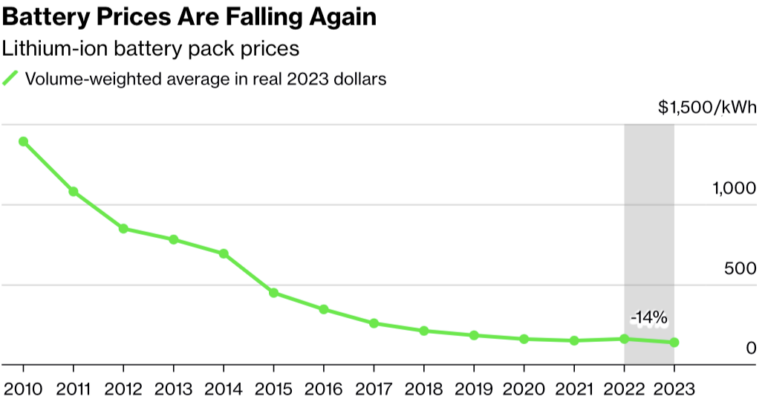From pv magazine Global
BloombergNEF said in its latest annual study on lithium-ion batteries that the average price of battery packs has fallen this year to USD 139/kWh ($209/kWh), or 14% less than the average of USD 161/kWh in 2022.
To calculate this average price, BNEF conducted more than 300 surveys among buyers and sellers of lithium-ion batteries for electric passenger vehicles, commercial vehicles, buses, two- and three-wheeled vehicles, and energy storage applications.
Prices vary by sector: Chinese electric buses and commercial vehicles have the lowest prices at USD 100/kWh. The average price of packs for fully electric passenger cars was USD 128/kWh.
“However, the story behind this price decrease is somewhat different from previous years,” the analysts said. While the main cause of falling battery prices has historically been technological innovation, this year the price drop is mainly attributed to reduced raw material costs.
Prices for key battery metals, especially lithium, have fallen sharply since January, due to significant growth in production capacity in all parts of the battery value chain, from raw materials and components to cells and battery packs.
Although demand continued to increase year on year, the pace of growth in some electric vehicle markets slowed in the second half of the year, mainly due to increased financing costs and economic uncertainty. On the other hand, battery production in China alone exceeded global demand.
As for the future, BNEF’s energy storage team expects prices to closely follow the trajectory of raw material prices. “We project that pack costs will fall to USD 133/kWh next year in real terms in 2023,” said BNEF. “In the long term, if the learning pace of the previous year is maintained, battery prices will fall below USD 100 /kWh in 2027.”
BNEF said that local battery manufacturing in regions such as the United States and Europe can drive up prices in the short term due to the price of energy, equipment, land and labor in these regions compared to Asia.
“However, as the industry matures, these costs could end up falling,” the report said.
This content is protected by copyright and may not be reused. If you want to cooperate with us and would like to reuse some of our content, please contact: editors@pv-magazine.com.








By submitting this form you agree to pv magazine using your data for the purposes of publishing your comment.
Your personal data will only be disclosed or otherwise transmitted to third parties for the purposes of spam filtering or if this is necessary for technical maintenance of the website. Any other transfer to third parties will not take place unless this is justified on the basis of applicable data protection regulations or if pv magazine is legally obliged to do so.
You may revoke this consent at any time with effect for the future, in which case your personal data will be deleted immediately. Otherwise, your data will be deleted if pv magazine has processed your request or the purpose of data storage is fulfilled.
Further information on data privacy can be found in our Data Protection Policy.